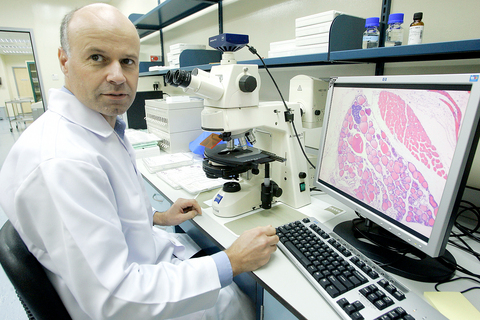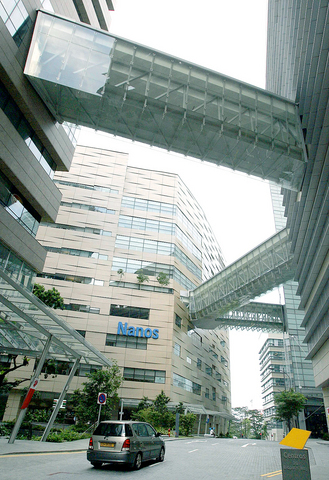Singapore believes it has seen the future, and its name is the Biopolis.
The sparkling new US$300 million suburban complex of angular buildings, erected on hilly ground next to the Ministry of Education, is the nerve center of the city-state's campaign to become a global science hub.
Scientists from Europe, North America and Asia are now relocating to the Biopolis, thanks to attractive salaries, an expatriate-friendly environment and relatively liberal rules on cutting-edge fields like stem cell research.

PHOTO: AFP
At the same time, more than 500 of Singapore's brightest students are now being sent to top foreign universities to earn doctorates and lead Singapore's charge into the brave new world of biomedical industries in the 21st century.
With assembly-line manufacturing under long-term threat from lower-cost countries, Singapore is banking on science as a new economic growth engine.
It hopes a thriving research sector will produce a long-term windfall from patented discoveries and steadily reduce Singapore's heavy dependence on the cyclical and increasingly crowded electronics sector.

PHOTO: AFP
"Never fall in love with an industry," said Philip Yeo, the co-chairman of the Economic Development Board (EDB), the investment promotion agency that was instrumental in Singapore's rise as a top electronics production center.
Now, as concurrent head of the Agency for Science, Technology and Research, Yeo is nudging Singapore toward "knowledge economy" industries centered at the Biopolis, where brains, investment and public funding are all in one place.
"The day we relax, we're a goner," Yeo said.
The academics are literally being turned into poster boys and girls of the agency to convince students to take up science as a profession.
"In Singapore we don't glorify footballers," Yeo said.
It will cost up to US$600,000 to finance the education of each student from a basic university degree to a full-blown doctorate, eight years of study which the student must repay with six years of service to the government.
About 15 percent of the academics are naturalized citizens.
One of them is Chinese-born Liang Jing, 24, who is pursuing a degree in biomedical engineering at the University of Michigan. He is the only child of an engineer and his wife who migrated to Singapore when he was 11.
"I do not come from a wealthy family. Without this scholarship, I would probably do a local engineering degree instead," he said by e-mail.
Liang said he wants to someday head "a self-sustaining research institute in Singapore that does not depend on government funding once established."
Yeo says the country wants "hungry kids from the region" to help power its scientific ambitions.
"Intelligence is not enough. You need hunger," he said.
Science academics are in Yeo's words "more expensive than an infantry battalion" but Singapore can well afford it -- it has close to US$120 billion in foreign reserves.
The first of the newly-minted doctors will return in 2008 and 2009 to jobs with starting salaries of more than US$40,000 a year, and stand to earn much more in the private sector after they complete their government study bonds.
It's already well-known in the scientific world that Singapore is out to lure some of the best names in basic research.
One of those who have moved here is Alan Coleman, the British scientist who in 1996 delivered Dolly the sheep, the world's first cloned mammal.
When the Biopolis is fully occupied, it can host about 2,000 scientists engaged in stem cell, cancer and other forms of fundamental research aimed at finding cures for some of the oldest and most debilitating diseases.
In buildings named Matrix, Centros, Nanos, Genome, Helios, Chromos and Proteos interlinked by pedestrian skyways, scientists in laboratory coats and jeans work in meticulously planned surroundings at the Biopolis.
The buildings are clustered around a courtyard with restaurants, a wine bar, a convenience store and a hair salon.
There's a laundry that also sells laboratory coats.
Old trees have been planted in the middle of the courtyard, with artificial waterfalls and a carp pond giving the Biopolis a park-like atmosphere.
A prison next door where some shirtless inmates can still be seen from the laboratories will give way to the further expansion of the Biopolis, which will also have its own business hotel, condominium and gourmet restaurants.
"The key is to bring in critical mass, co-locate," Yeo said.
The Singapore government itself has an investment arm, BioOne Capital Pte Ltd, which manages more than US$700 million in funds invested in biomedical business ventures worldwide including some in Biopolis itself.
One of the foreign companies now operating there is British firm Paradigm Therapeutics, which specializes in early-stage drug discovery particularly for the central nervous system, metabolic diseases and pain. It now employs nine scientists at Biopolis and plans to double its staff over the next year.
Ian Gray, its director of research, said Singapore's stable infrastructure, English-speaking environment and strong skills base in molecular biology and cell culture were strong attractions for his firm.
"We have samples that are stored at minus 80 degrees. We can't afford for the power to go down for any length of time," he said.
A high-level panel has recommended the doubling of Singapore's research and development spending to more than US$7 billion over the next five years, which means more scholarships for Singaporeans, native or naturalized.
Prime Minister Lee Hsien Loong, a British-educated mathematician, announced over the weekend that he will chair a new Research, Innovation and Enterprise Council that will oversee the ambitious drive to make money out of science.
"There are risks in this approach, but we have to do this," Lee said. "If we succeed, we will gain competitive advantage that puts us ahead for 15 to 20 years."

MAKING WAVES: China’s maritime militia could become a nontraditional threat in war, clogging up shipping lanes to prevent US or Japanese intervention, a report said About 1,900 Chinese ships flying flags of convenience and fishing vessels that participated in China’s military exercises around Taiwan last month and in January last year have been listed for monitoring, Coast Guard Administration (CGA) Deputy Director-General Hsieh Ching-chin (謝慶欽) said yesterday. Following amendments to the Commercial Port Act (商港法) and the Law of Ships (船舶法) last month, the CGA can designate possible berthing areas or deny ports of call for vessels suspected of loitering around areas where undersea cables can be accessed, Oceans Affairs Council Minister Kuan Bi-ling (管碧玲) said. The list of suspected ships, originally 300, had risen to about

DAREDEVIL: Honnold said it had always been a dream of his to climb Taipei 101, while a Netflix producer said the skyscraper was ‘a real icon of this country’ US climber Alex Honnold yesterday took on Taiwan’s tallest building, becoming the first person to scale Taipei 101 without a rope, harness or safety net. Hundreds of spectators gathered at the base of the 101-story skyscraper to watch Honnold, 40, embark on his daredevil feat, which was also broadcast live on Netflix. Dressed in a red T-shirt and yellow custom-made climbing shoes, Honnold swiftly moved up the southeast face of the glass and steel building. At one point, he stepped onto a platform midway up to wave down at fans and onlookers who were taking photos. People watching from inside

Japan’s strategic alliance with the US would collapse if Tokyo were to turn away from a conflict in Taiwan, Japanese Prime Minister Sanae Takaichi said yesterday, but distanced herself from previous comments that suggested a possible military response in such an event. Takaichi expressed her latest views on a nationally broadcast TV program late on Monday, where an opposition party leader criticized her for igniting tensions with China with the earlier remarks. Ties between Japan and China have sunk to the worst level in years after Takaichi said in November that a hypothetical Chinese attack on Taiwan could bring about a Japanese

The WHO ignored early COVID-19 warnings from Taiwan, US Deputy Secretary of Health and Human Services Jim O’Neill said on Friday, as part of justification for Washington withdrawing from the global health body. US Secretary of State Marco Rubio on Thursday said that the US was pulling out of the UN agency, as it failed to fulfill its responsibilities during the COVID-19 pandemic. The WHO “ignored early COVID warnings from Taiwan in 2019 by pretending Taiwan did not exist, O’Neill wrote on X on Friday, Taiwan time. “It ignored rigorous science and promoted lockdowns.” The US will “continue international coordination on infectious